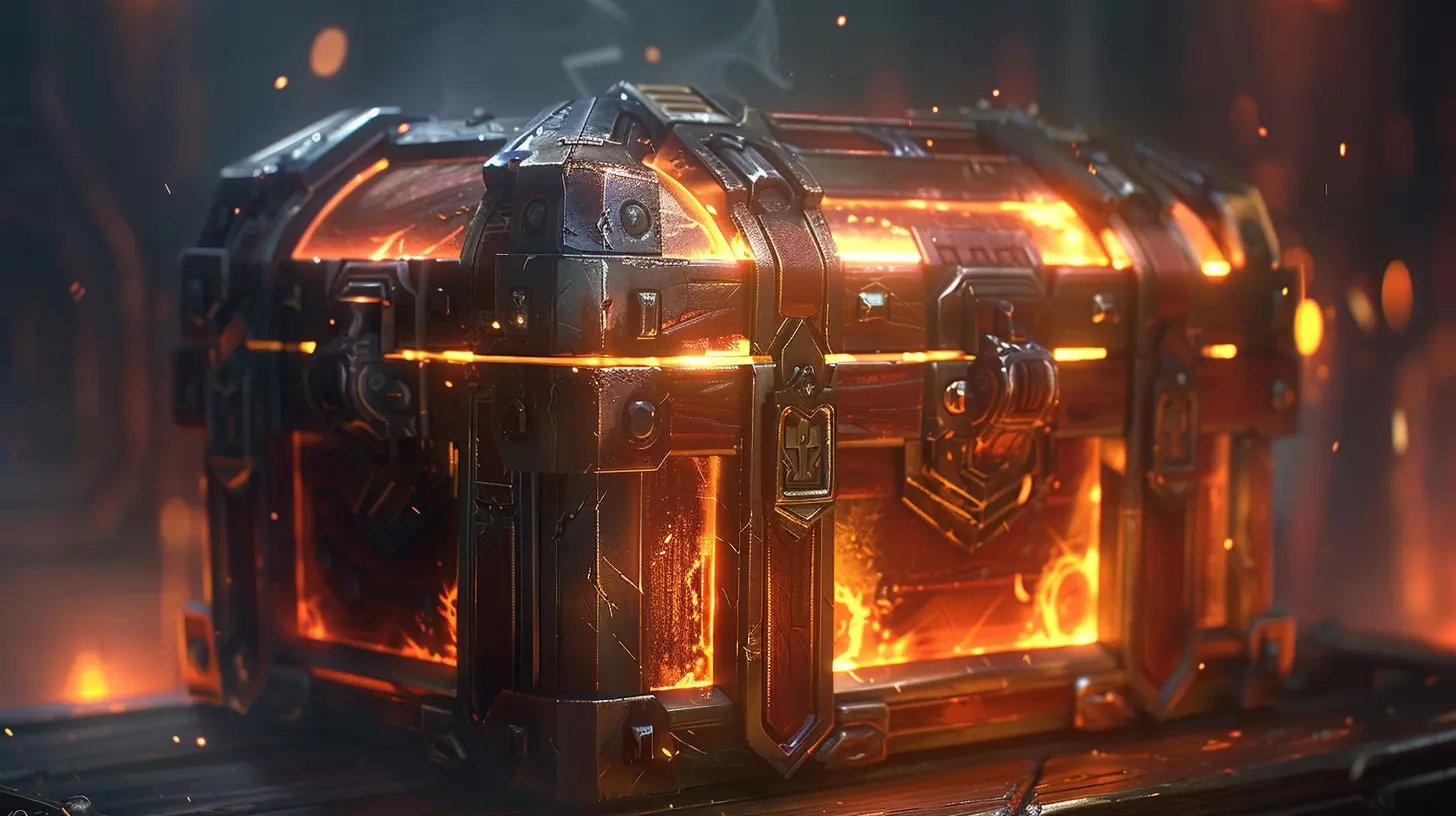How Countries Are Regulating Loot Boxes
28 September 2025
Let’s be real: loot boxes are pretty much the Kinder Surprise of video games—except instead of chocolate eggs, you’re dumping your money into a digital slot machine hoping for that shiny, ultra-rare skin or gear. But here's the twist: while a surprise in a physical toy might be all fun and games, the virtual version has sparked a global firestorm.
So what’s got everyone—from gaming fans to governments—flipping their controllers? The answer lies in the increasingly shady overlap between loot boxes and gambling. And surprise (not the loot box kind), different countries are handling this digital dilemma in wildly different ways.
Let’s dive into this wild, pixel-filled global journey of how countries are regulating loot boxes. Buckle up, because things are about to get legislative!
🎮 Wait, What Exactly Are Loot Boxes?
Before we get into the legal nitty-gritty, let’s make sure we’re all on the same level.Loot boxes are essentially digital mystery boxes in video games. You pay real or in-game currency and get randomized rewards—think cosmetic items, weapons, or sometimes game-changing gear. They're like virtual scratch cards, minus the silver coating.
While their intent was once harmless fun, they’ve evolved into profit machines. And trust me, publishers are raking it in like kids in a candy store. But what happens when things start to feel a little too much like gambling? That’s where governments step in.
🌍 Different Countries, Different Rules
Alright, so picture this like a reality show where countries are contestants trying to figure out how to deal with loot boxes. Some are strict, some are chill, and a few are still scratching their heads.Let’s check out the players.
🇧🇪 Belgium: “Nope, Not in My Game”
Belgium didn't just dip its toe into the loot box debate—it cannonballed straight into it. In 2018, the Belgian Gaming Commission declared that certain types of loot boxes were a form of gambling. And just like that—BOOM—publishers had to comply or get out.Big names like Blizzard, Valve, and EA either disabled loot boxes or modified their games for Belgian players. FIFA packs? Gone. Overwatch loot crates? Poof.
Belgium's stance is pretty hardcore, but it's clear: anything that involves paying real money for randomized rewards = gambling.
🇳🇱 The Netherlands: “Same Boat, Different Paddle”
Just next door, the Netherlands took a similar stance, albeit with a bit more legal back-and-forth. Initially, Dutch regulators ruled that loot boxes violated gambling laws. Games like FIFA were slapped with hefty fines.But, plot twist: in 2022, a Dutch court overturned that ruling. So now loot boxes are kind of in a legal limbo. One day they’re gambling, the next they’re good to go.
Uncertainty level? High. But stay tuned—more plot twists are surely coming.
🇬🇧 United Kingdom: “Let’s Study It First”
Across the channel, the UK is taking a more… British approach. After mounting public pressure, especially from worried parents, the UK Parliament launched several investigations into loot boxes.Their conclusion? Loot boxes don't quite fit the traditional idea of gambling—but they certainly can be harmful. Especially to kids.
The government’s solution? Encourage game developers to self-regulate. Basically: “We’re watching you. Don’t mess this up.”
So far, the UK hasn’t outlawed loot boxes, but they are pushing for more transparency and parental controls. It’s more of a “try to behave” than a full-on crackdown.
🇯🇵 Japan: The OG Regulator
Surprise! Japan was one of the first countries to put loot boxes under the microscope—way before it was trendy.Back in 2012, Japan cracked down on something called “kompu gacha,” a mechanic similar to loot boxes where players collect items to complete a set. The issue? Completing the set often required a ton of spending and luck, making it super exploitative.
Following a public outcry, the government introduced strict regulations. Now, games in Japan must disclose drop rates and avoid certain predatory designs.
So, hats off to Japan—they kinda invented loot box regulation before it was cool.
🇨🇳 China: Transparency is Key (And Also Mandatory)
China said, “Fine, you can have your loot boxes, but only if you play fair.”Game publishers in China are required by law to clearly list the drop rates for all loot box items. That means players know exactly how bad their odds are before spending a single yuan.
Also, loot boxes in many Chinese games are tied to gameplay rather than direct monetary purchases, making the process a bit less aggressive.
It’s like a giant neon sign saying, “Proceed with caution (but at least you can see the odds).”
🇦🇺 Australia: Watching, But Not Yet Jumping
Australia's response to loot boxes can be summed up as: “We’re concerned… but not doing a whole lot yet.”Several studies have linked loot boxes to problem gambling, especially among younger players. There’s been talk about tighter regulation, especially after a 2020 Senate inquiry, but no major legislative action yet.
Think of Australia as the person who sees smoke and starts Googling “how to use a fire extinguisher” instead of calling 911. They're aware of the problem—just not quite tackling it head-on yet.
🇺🇸 United States: A Mixed Bag of Laws and Lawsuits
Ah, the land of the free (and the microtransaction). The U.S. doesn’t have a federal loot box law—yet—but individual states are starting to stir.Hawaii, for example, once proposed bills to ban loot boxes and restrict sales to minors (though they didn’t pass). Meanwhile, class-action lawsuits have popped up like mushrooms after rain, with publishers like EA and Apple facing backlash.
The FTC has also hosted workshops to discuss loot box practices, but again, we're still in the “fact-finding” stage. The U.S. approach? Kind of like herding cats—everybody’s doing their own thing.
🇰🇷 South Korea: “Let’s Talk About Honesty”
South Korea doesn’t mess around when it comes to digital stuff, and loot boxes are no exception. Back in 2015, the country passed laws requiring publishers to disclose item drop rates.Oh, and if companies try to play dirty? Fines and public call-outs await. Nexon, a major publisher, once got slapped with a whopping $800,000 fine for manipulating drop odds. Oof.
So over in Korea, transparency isn't just encouraged—it's enforced with a steel-toed boot.
Why Are Loot Boxes So Controversial Anyway?
Glad you asked. The biggest issue with loot boxes is how they mess with our brains. Yep—there’s actual science behind it.Loot boxes tap into the same kind of psychological triggers as gambling. The thrill of the unknown, the rush when you score big, the “just one more try” mentality—it’s a dopamine party in your brain.
Now imagine mixing all that with the impulsiveness of a 12-year-old and a parent’s credit card. Not exactly a recipe for financial responsibility.
🎯 So What’s the Right Approach?
Honestly? There’s no one-size-fits-all solution here. Some players love loot boxes for the surprise, others hate them as paywalled content. Some countries slap them with gambling laws, others wave them through with a wink and a promise.But here's a thought: maybe it’s time game developers put player trust and kid safety ahead of flashy profits.
Or, at the very least, how about some REAL odds disclosure, better parental controls, and maybe not hiding the best items behind 20 boxes and a prayer?
🕹️ What Can You Do as a Gamer?
Okay, so governments are slow, publishers are… well, publishers, but what about you?- Stay informed. Know which games have loot boxes and how they work.
- Be skeptical. Just because a box might have a rare item doesn’t mean it will.
- Support transparent games. Reward devs who ditch pay-to-win for fair systems.
- Teach kids. If your little cousin is blowing $50 on Roblox boxes, it’s time for a chat.
✋ Final Thoughts (and a Small Rant)
Loot boxes aren’t inherently evil, but left unchecked, they’re a slippery slope into digital slot-machine chaos. Some countries are getting it right. Others? Not so much.Gamers deserve better. We deserve fun, rewarding gameplay that doesn’t feel like a high-stakes gamble. So whether you're in Belgium, California, or somewhere in between—keep your eyes open and your wallets closed (unless it's a really, really good skin… kidding. Probably.
all images in this post were generated using AI tools
Category:
Loot BoxesAuthor:

Jack McKinstry
Discussion
rate this article
1 comments
Wesley Perry
Great read! It's fascinating to see how different countries are tackling loot boxes. This evolving landscape could shape the future of gaming—kudos for breaking it down so clearly! Keep it up!
October 5, 2025 at 3:29 AM

Jack McKinstry
Thank you so much for your feedback! I'm glad you found it insightful. The regulation of loot boxes is indeed crucial for the future of gaming.


